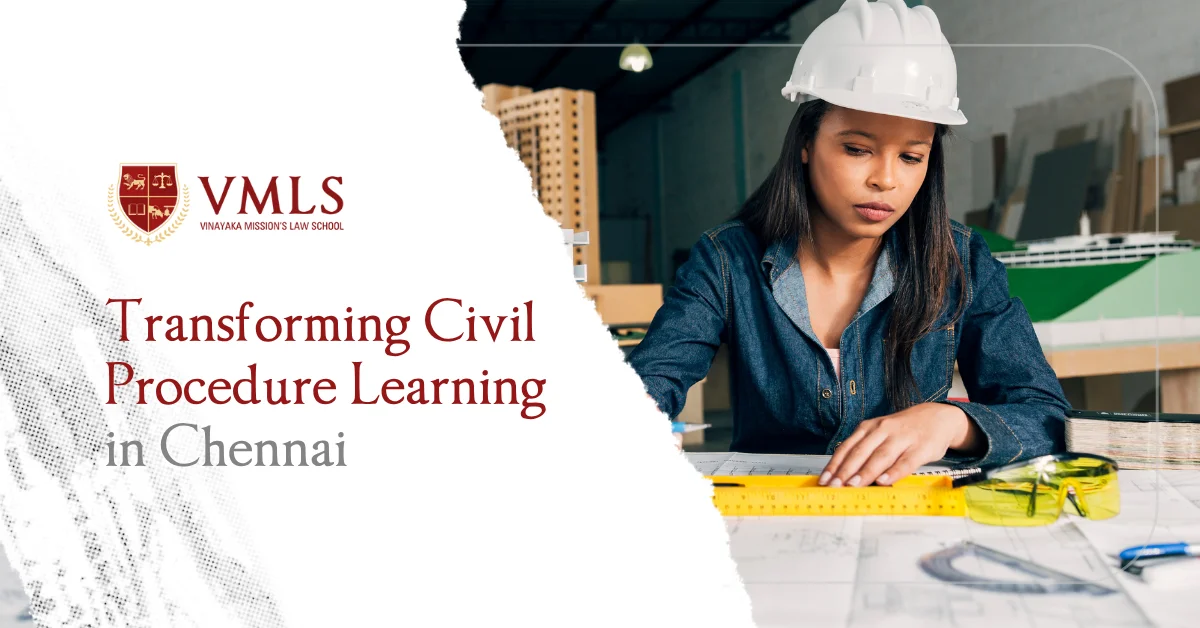June 02, 2025
0 Views

In a country where the justice system is often criticized for being inaccessible, slow, and intimidating, the real question for many isn't whether justice exists; it's whether they can reach it. Legal jargon, procedural complexities, and the sheer weight of navigating a court case can discourage even the most determined individuals from seeking help. This is where clinical legal education (CLE) plays a quiet but powerful role, not just as a way of teaching law, but as a bridge between justice and the people who need it most.
In this environment, clinical legal education (CLE) is presented not simply as a pedagogical technique but as a radical project. It is a bridging course between the academic law taught in the classroom and the actual framework of justice, particularly for students in a 3-year LLB degree in Chennai.
The Civil Procedure Code (CPC) is the primary legislation for conducting civil suits in India. But it can also feel like it is taught merely as a bunch of sections and orders on paper, and not grounded in practice. CLE changes that by applying students directly to the practical realities of the law.
In legal clinics and internships, and by interacting with clients, students draft plaints, write statements and file applications. They see firsthand how summons are served, what procedural delays mean in practice for litigants and how evidence is collected and contested — they turn black-letter law into a rigorously lived experience.
For example, rather than simply learning how to file an injunction under Order XXXIX, CLE students will watch those motions argued in court. Under the guidance of practicing attorneys, they will learn and participate.
Furthermore, students gain experience in legal reasoning, which, as in the case with legal instinct, cannot be taught in a classroom setting alone, through things such as mock trials, legal aid, and Alternative Dispute Resolution. With employers requesting practice-ready graduates, CLE has the potential to be an important factor for students pursuing their 3-year LLB.
CLE also teaches something that no textbook can teach. In working with real clients from vulnerable communities, students begin to understand what the law really means to those without money, power, or connections. They learn that even the smallest legal relief, like a stay order, a notice served on time, a well-drafted petition can change someone's life.
CLE for social justice programs in Chennai open up new horizons for students than corporate internships or elite litigation. They emphasize that being a lawyer is more than a job, but rather an act of public service.
CLE, although promising, is also confronted by structural challenges. There are plenty of law colleges without sufficient funding, qualified faculty, or connections to the local court system. Students frequently find it difficult to juggle academic and clinic obligations. Law that is taught only in theory risks creating graduates who understand the law but don't know how to execute it.
Prospective law students may also want to inquire whether an institution they are considering incorporates CLE throughout its courses. There exist a few law Schools in Chennai which inculcate legal-aid clinics, mandate internships with trial courts, and encourage participation in community-based legal aid, one among them is Vinayaka Mission's Law School situated at Paiyanoor.
In a justice system still weighed down by inequality and delay, CLE brings the law back to its original purpose i.e., service. CLE isn't just an exposure for law students of Chennai, it's a transformation. With each interview, court filing and client conversation, students get closer to realizing not just that they know something about being a lawyer, but why they wanted to be a lawyer in the first place.
Several students across India are choosing law as a career due to the various benefits it offers.
The 3-year LLB (Bachelor of Legislative Law) programme is an undergraduate programme designed to cater...
Vinayak Mission's Law School (VMLS) is one of the best law schools in India and is being mentored by O. P. Jindal Global...
In India, law is seen as a noble career option, and the number of students interested in pursuing law is increasing.
If you are willing to work in a legal advisory firm, judiciary, or as a lawyer, then pursuing a law degree plays...
CLAT is a national-level entrance exam, and it stands for Common Law Entrance Test. Many top law universities in India.